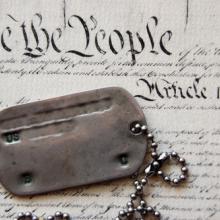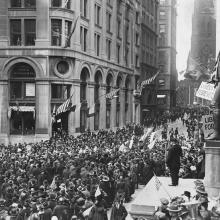veterans day
In the wake of the latest escalation of the U.S. “war on terror,” it’s time to remember the origin of Veterans Day. In 1926, Congress officially recognized the commemoration of Armistice Day on Nov. 11 with the exhortation, “the recurring anniversary of this date should be commemorated with thanksgiving and prayer and exercises designed to perpetuate peace through good will and mutual understanding between nations.” Armistice Day commemorated the day when World War I hostilities ceased, and had been celebrated informally since 1919 as a day to work for peace.
World War I hostilities ceased at 11 a.m. on the 11th day of the 11th month, Armistice Day, 1918. Dubbed “The war to end all wars,” World War I closed with a commitment to peace. A year later, President Woodrow Wilson proclaimed Nov. 11, 1919, the first commemoration of Armistice Day, a day for America “to show her sympathy with peace and justice in the councils of the nations.”
When, in 1926, the U. S. Congress officially recognized the commemoration, it proclaimed, “the recurring anniversary of this date should be commemorated with thanksgiving and prayer and exercises designed to perpetuate peace through good will and mutual understanding between nations.” Armistice Day became a legal holiday in 1938, as a day dedicated to the cause of world peace.
In a culture of war and empire, it’s time to reclaim Nov. 11 as a day of peace.
When I go out with my Dad, he often wears a cap identifying him as a Korean War veteran. Over and over again, people tell him, “Thank you for serving.” Over and over again.
I’m always struck by the contrast between that appreciation and the sad, hidden truth about our country’s treatment of some other veterans. I’m speaking of the government’s detention and deportation of many immigrants who served in our armed forces but who are not yet citizens.
The first time I heard about this was 1998. My friend’s husband, a Canadian who grew up in Texas and chose to serve in Vietnam had recently gotten a deportation order based on some old drug charges, the kind of thing many vets experienced. What horrified me then, and still does today, is that immigration judges could not grant an exception. Nothing could stop the deportation except a change in U.S. immigration laws.
When Staff Sgt. Brandon Hill came home from his third tour in Iraq last year, he expected his wife and young daughters at the welcoming ceremony. What he didn't expect were the pastors, secretaries and members of their Assemblies of God church to be there, too.
“It was awesome -- the fact that they would give up their time to come see us back,” said Hill, who is stationed at Fort Sill, an Army installation in Lawton, Okla. “It really shows that they really care.”
As Veterans Day approaches, denominational leaders and chaplains with years of military service are calling on more churches to find ways to minister to the men and women who have recently returned from Iraq and Afghanistan.
Chaplain Keith Ethridge, director of the Department of Veterans Affairs’ National Chaplain Center, said about 1 million military members have returned to civilian life -- with some continuing in Guard or Reserve forces -- after serving in Iraq or Afghanistan.
While some churches, especially those near military installations, might advertise themselves as being “military friendly,” Ethridge and other leaders are trying to expand that universe to other American congregations.
“What we try to do is encourage, in general, a supportive atmosphere,” said Ethridge, whose center is in Hampton, Va. “We want our clergy and our churches at large to be aware of how they can make referrals when they have friends or loved ones in need of support.”
In recent years, the VA has ramped up training, including in rural areas, for clergy to learn more about veterans’ issues and how they can refer former military members facing physical and spiritual health challenges. It held eight training events for rural clergy in 2012, and more are planned for 2013.
As part of his new work as a chaplaincy executive with the Southern Baptist Convention, retired Army Chief of Chaplains Douglas Carver is urging congregations to be places where veterans can turn as they make the transition home.
Carver knows the challenges firsthand: “I retired a year ago, and one of the hardest things for me to do is to transition back to a community.”
Today’s veterans are suffering through the current recession. They have a higher unemployment rate are are more likely to be or become homeless than the rest of the U.S. population.
Thankfully, the Senate yesterday unanimously passed jobs for veterans legislation that should begin to help.
But other problems remain. As many as 25 percent have symptoms of post-traumatic stress disorder and suicides are rising. Forty-six-thousdand have suffered devastating physical injuries, and as many as 360,000 may have brain injuries.
With this set of problems, the Veterans Administration doesn’t have the necessary resources to meet the profound need.
Christians are called to be peacemakers and healers. Disagreement on policy does not excuse us from a responsibility to help those who come home broken and in need of help.
You might call yourself a pacifist, a just-war theorist, a pragmatist, a dove or a hawk but today (and every day), you should be a good neighbor to a veteran.
“I wore chains just like these for over six years, a burden too great to bear for many like me, who stood ready to do violence in the name of the American people and way of life. In Genesis, Cain was the first person to have killed another human being, and we’ve been doing it ever since. As punishment, Cain was sentenced to a life of wandering, a burden he claimed was too great to bear.
"After the towers fell a decade ago, I reenlisted and was deployed overseas with an infantry platoon for Operation Iraqi Freedom in 2004. Wandering the Mesopotamian wilderness like Cain before me, I saw things nobody should ever have to see. My heart hardened in the desert heat like the mud bricks I watched cure in the Iraqi sun.
"After coming home, I found war had infected my mind. Images and memories from Iraq would haunt my dreams and invade my thoughts. Not too different from the suffering endured by American and Iraqi families who have lost someone to war, I too lost someone on the field of battle – myself. I had sacrificed more than I bargained for, a lifetime of mental health and well-being forever crushed by the heavy yolk I bore as a combat soldier."
Before Veteran’s Day was Veteran’s Day, it was Armistice Day.
On the 11th hour of the 11th day of the 11th month in 1918, the cessation of hostilities of World War I took effect.
It was supposed to be the end of the "war to end all wars."
In 1926, Congress passed a resolution to commemorate the day “with thanksgiving and prayer and exercises designed to perpetuate peace through good will and mutual understanding.”
In 1938 the day became known as “Armistice Day” with the intent that it would be a day dedicated to the world peace.
In 1954, after World War II, when the world stood in horror at the sight of the Nazi genocide machine and ghastly bombings of civilian populations culminating in the first ever deployment of nuclear bombs, the day became known as Veteran’s Day — a day to honor military service.
I say if we are to truly honor veterans, we ought to remember and honor Armistice Day with the hope that we can bring an end to violent conflict within and between nations.






